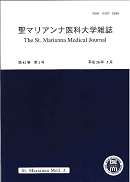We reviewed our experience with thymic epithelial tumors that were surgically resected between May 2007 and October 2018 at the Department of Chest Surgery (St. Marianna University School of Medicine, Kanagawa, Japan) to identify and categorize the clinical and pathological characteristics. We reviewed 84 cases [36 males (42.9%), 48 females (57.1%)] which included 74 thymomas, 10 thymic cancers, and 12 cases of thymoma with myasthenia gravis. The average age was 60.9 years (range, 17–87 years). Median maximum tumor diameter was 4.5 cm (range, 1.1–10 cm). The median period of post-operative observation was 37 months, and the 5-year recurrence-free survival rate was 96.4%. Three patients (two thymomas and one thymic cancer) presented with recurrent disease; all three underwent secondary resection and two were treated with adjuvant chemotherapy. No deaths were reported. Aggressive secondary excision and chemotherapy may be indicated for patients with thymic epithelial tumors who experience recurrent disease after the initial surgery.
View full abstract
